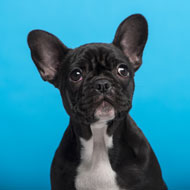Birth problems 'most likely in French bulldogs'

The findings add further weight to concerns about the welfare of brachycephalics, which have soared in popularity in recent years.
French bulldogs are nearly 16 times more likely to have difficulties giving birth according to new research, which found brachycephalic dogs face the greatest risk of dystocia.
VetCompass, a research project led by the RVC, collects clinical information on more than six million companion animals undergoing veterinary care in the UK.
For this study, researchers investigated 20,000 bitches that received emergency veterinary care at 50 Vets Now surgeries. Of these, 3.7 per cent were treated because of difficulties encountered while giving birth.
French bulldogs were the most commonly affected; researchers found they were 15.9 times more likely to have problems than crossbred bitches. Difficulties were 12.9 times more likely in Boston terriers, 11.3 times in pugs and 10.4 times in Chihuahuas.
Researchers say the findings add further weight to concerns about the welfare of brachycephalics, which have soared in popularity in recent years. Owners should give careful consideration to breeding any dog, particularly if it is brachycephalic.
“Giving birth in dogs is not always a benign process and our research shows this risk is especially exacerbated in some common brachycephalic and toy breeds,” commented Dr Dan O’Neill, a companion animal epidemiologist for VetCompass.
“Prospective owners should bear these welfare costs for high risk breeds in mind when choosing their new puppy.”
Previous RVC research found that appearance is the number one reason why owners purchase brachycephalics, despite the fact that extreme conformation is linked with a variety of inherited diseases.
The study also raised concerns about the purchasing habits of these dog owners; they were found to be more likely to use puppy selling websites and less likely to see their puppy’s parents, or to ask for any health records.
Lead author Rowena Packer said: “Potential puppy buyers attracted to the appearance of these breeds should seriously consider whether they are emotionally and financially prepared to take on a breed with high risks of health complications, and consider whether alternative, lower risk breeds would better fit their lifestyle.”



 The RCVS has announced a new version of its 1CPD mobile app, with enhanced features for veterinary surgeons and veterinary nurses to record their continuing professional development.
The RCVS has announced a new version of its 1CPD mobile app, with enhanced features for veterinary surgeons and veterinary nurses to record their continuing professional development.